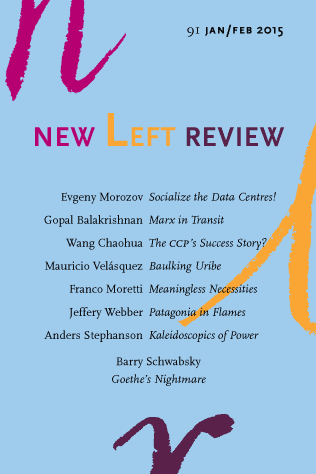
CONTENTS
-
Wang Chaohua: The Party and its Success Story
How should the balance-sheet of Chinese Communism be assessed? In a rejoinder to Perry Anderson’s comparison of the Russian and Chinese revolutions, Wang Chaohua delivers a critical verdict on the record of Mao’s utopianism and Deng’s pragmatism, and the bleak legacy of the crushing of popular aspirations in 1989.
-
Franco Moretti: Lukács’s Theory of the Novel
Centenary reflections on one of the landmarks of twentieth-century thought about literature. Lukács in tension between Novalis and Weber during the Great War, and the implications for literary enquiry today of a conjugation that could never historically be repeated.
-
Evgeny Morozov: Socialize the Data Centres!
The leading iconoclast of Internet euphoria recounts his path from schooling in Belarus through training in Bulgaria to NGO work in Central Europe and fame as author of The Net Delusion in the United States. A radicalized view of the transformations required in the information infrastructures of the present for any egalitarian future.
-
Gopal Balakrishnan: The Abolitionist—II
In the second part of a sweeping reconstruction of the development of Marx’s thought, the ways in which bourgeois society came to be replaced by capitalism as the cardinal object of investigation after the collapse of the revolutions of 1848, and the political lessons of his passage across that watershed for rebellions in the new century.
-
Mauricio Velásquez: The Battle of Bogotá
In a high-stakes election, South America’s most ruthless recent embodiment of reaction, Álvaro Uribe, lost his bid to install a minion in the presidential palace and pursue the extermination of guerrilla forces in Colombia. Mauricio Velásquez analyses the electoral victory of Uribe’s one-time confederate Santos, and the prospects for civil peace in its wake.
BOOK REVIEWS
- Anders Stephanson on Michael Mann, The Sources of Social Power, Volume IV: Globalizations, 1945–2011. Strengths and frailties of the climax to a unique macro-sociological enterprise, as it reaches the theoretical sands of the contemporary world.
- Barry Schwabsky on Winnie Won Yin Wong, Van Gogh on Demand. How different are Shenzhen trade-painters copying Western artists from the conceptualists using them?
- Jeffery R. Webber on Julio Ferrer, Osvaldo Bayer Íntimo. Heroic itinerary of Argentina’s most intransigent journalist and historian, recorder of popular revolts and scourge of military tyrants.
Articles:
-
Franco Moretti,
‘Lukács’s Theory of
the Novel’
Centenary reflections on one of the landmarks of twentieth-century thought about literature. Lukács in tension between Novalis and Weber during the Great War, and the implications for literary enquiry today of a conjugation that could never historically be repeated.
-
Mauricio Velásquez,
‘The Battle of Bogotá’
In a high-stakes election, South America’s most ruthless recent embodiment of reaction, Álvaro Uribe, lost his bid to install a minion in the presidential palace and pursue the extermination of guerrilla forces in Colombia. Mauricio Velásquez analyses the electoral victory of Uribe’s one-time confederate Santos, and the prospects for civil peace in its wake.
-
Anders Stephanson,
‘Empire Edgemanship’
Anders Stephanson on Michael Mann, The Sources of Social Power, Volume IV: Globalizations, 1945–2011. Strengths and frailties of the climax to a unique macro-sociological enterprise, as it reaches the theoretical sands of the contemporary world.
Editorials:
-
Annexations,
After decades of connivance with territorial seizures from Palestine to East Timor, the West rediscovers the principle of state sovereignty in Crimea. The actual record of 20th-century land grabs, and the cross-cutting geopolitical pressures bearing down on Ukraine.
-
2011,
Echoes of past rebellions in 2011’s global upsurge of protest. Against a backdrop of world economic slump, what forces will shape the outcome of contests between a raddled system and its emergent challengers?
-
Arab Concatenation,
From Tunis to Manama, 2011 has brought a chain-reaction of popular upheavals, in a region where imperial domination and domestic despotism have long been entwined. A call for political liberty to reconnect with social equality and Arab fraternity, in a radical new internationalism.
-
Concert of Powers,
A reckoning of global shifts in political and economic relations, with China emerging as new workshop of the world and US power, rationally applied elsewhere, skewed by Israeli interests in the Middle East. Oppositions to it gauged, along with theoretical visions that offer exits from the perpetual free-market present.
-
NPT,
What are the geopolitical origins of the NPT, and what are its actual effects? Non-proliferation as nuclear privilege of the few, weapon of intimidation of the one, submission of the many—and its impact on the peace movement.
-
Afghanistan,
Reasons for the West’s stalemate in Afghanistan sought neither in lack of troops and imperial treasure, nor in Pakistani obstruction, but in the very nature of the occupation regime. Tariq Ali on the actual results of ‘state-building’ in the Hindu Kush, as a broken country is subjected to the combined predations of NGOs and NATO.
-
Wall Street Crisis,
Against mainstream accounts, Peter Gowan argues that the origins of the global financial crisis lie in the dynamics of the New Wall Street System that has emerged since the 1980s. Contours of the Atlantic model, and implications—geopolitical, ideological, economic—of its blow-out.
-
NLR at 50,
What remains of the neo-liberal order after the implosion of 2008—with what implications for a journal of the left? Notes for a future research agenda, as NLR enters its quinquagenary year.
-
Force and Consent
As war looms again in the Middle East, what are the aims of the Republican Administration, and how far do they mark a break in the long-term objectives of US global strategy? The changing elements of American hegemony in the post-Cold War world.

